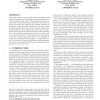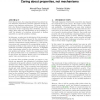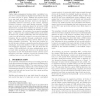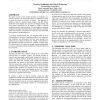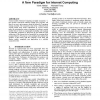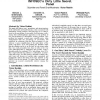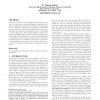NSPW
2004
ACM
13 years 10 months ago
2004
ACM
This paper considers a new security protocol paradigm whereby principals negotiate and on-the-fly generate security protocols according to their needs. When principals wish to in...
NSPW
2004
ACM
13 years 10 months ago
2004
ACM
Over the past years, the computing industry has started various initiatives announced to increase computer security by means of new hardware architectures. The most notable effort...
NSPW
2004
ACM
13 years 10 months ago
2004
ACM
Digital rights management systems allow copyrighted content to be commercialized in digital format without the risk of revenue loss due to piracy. Making such systems secure is no...
NSPW
2004
ACM
13 years 10 months ago
2004
ACM
We argue in favor of the explicit inclusion of suspicion as a concrete concept to be used in the analysis of audit data in order to guide the search for evidence of misuse. Our ap...
NSPW
2004
ACM
13 years 10 months ago
2004
ACM
Current models of Internet Computing are highly asymmetric – a host protects itself from malicious mobile Java programs, but there is no way to get assurances about the behavior...
NSPW
2004
ACM
13 years 10 months ago
2004
ACM
(by Victor Raskin) This panel will address users’ perceptions and misperceptions of the risk/benefit and benefit/nuisance ratios associated with information security products, an...
NSPW
2004
ACM
13 years 10 months ago
2004
ACM
Agile development methodologies are gaining acceptance in the software industry. If they are to be used for constructing securitycritical solutions, what do we do about assurance?...
NSPW
2004
ACM
13 years 10 months ago
2004
ACM
This paper presents a new paradigm for information theory which is a synthesis of Barwise-Seligman’s qualitative theory and Shannon’s quantitative theory. The new paradigm is ...
